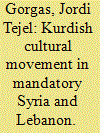| Srl | Item |
| 1 |
ID:
133824


|
|
|
|
|
| Publication |
2014.
|
| Summary/Abstract |
In the late nineteenth and early twentieth centuries diverse, and sometimes competing, movements of cultural renaissance emerged in the Middle East. Within this context, the Kurdish cultural renaissance in the Kurmanji dialect appeared relatively late and moreover its fruits were curtailed by two major events: the First World War and the establishment of the Turkish republic. From 1923 onwards, the task of animating the Kurdish cultural renaissance fell on the Kurds exiled first in mandatory Syria and Lebanon and then in Europe. In exile, Kurdish intellectuals benefited from some advantageous conditions such as freedom of speech and organization. Yet Kurdish intellectual endeavors in the Levant were to face political, social and economic challenges. Using French records and Kurdish newspapers, this article explores both the opportunities and the constraints for the consolidation of the Kurdish cultural renaissance under colonial rule. In doing so, the article intends to enrich the debate on the formation of nationalisms in the interwar era on the one hand, and the relationship between colonial powers and minorities in the Middle East, on the other.
|
|
|
|
|
|
|
|
|
|
|
|
|
|
|
|
| 2 |
ID:
090588


|
|
|
|
|
| Publication |
2009.
|
| Summary/Abstract |
Greater Osaka, a hub of commerce and industrial production during the interwar period, was the site for rapid development of diaspora communities, whose significant contribution to the regional music-culture has been little documented. This article describes three contexts for music-making among the largest ethnic minorities, the Koreans and Okinawans, on the basis of primary textual, oral and musical sources, as well as an emerging body of writings on Okinawan music in Osaka. People from Korea and Okinawa were involved in the broader musical life of the metropolis in diverse ways, as professional performers, and as producers and consumers of recordings. The reception of such 'foreign' music and musicians reflected the status accorded them in the colonial system and its underlying racial ideology.
|
|
|
|
|
|
|
|
|
|
|
|
|
|
|
|